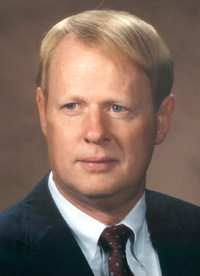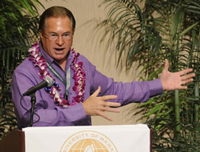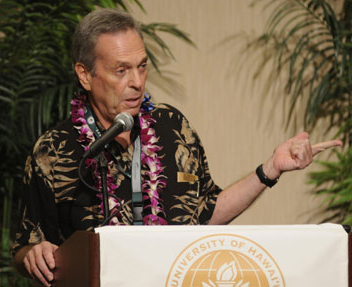
James Duderstadt on the Need to Create Intellectual Capital
University of Michigan President Emeritus James Duderstadt discusses the university’s role in creating intellectual capital.
Watch the video of his presentation below.
- Summarized highlights
- Response by Jay Shidler and Barry Weinman
- About James Duderstadt
- About the responders
Summarized highlights: The Importance of Creating Intellectual Capital
A knowledge-driven economy requires tertiary education, the ability to discover and apply new knowledge and entrepreneurial skills, Duderstadt said. Yet universities operate in an environment where there is strong pressure to reduce the relative pressure on taxpayers, educate a significant portion of the population and score high in college rankings.
“While increasing the attainment of college degrees helps to build a world-class workforce, it does not necessarily create the jobs that will employ that workforce,” he pointed out. Economists estimate that 40–60 percent of growth is due to research and development activity and another 20 percent is based on rising skill levels of the population—activities supported by higher education. Return on capital investment averages 10–14 percent while the private rate of return on R&D investment averages 25 percent and the social rate of return (benefits to society) is estimated to be as high as 50 percent, he noted. That’s why economists suggest investment in education and research can increase long-term economic growth and companies locate where talent is produced.
The space race drove education policy in the past, but it focused on the best and the brightest, Duderstadt said. The skills race of the 21st century will value skills and knowledge of an entire population.
In contrast to other developed nations, where aging populations, out migration and shrinking workforces challenge productivity, the United States continues to benefit from immigration—estimated to be responsible for half the nation’s growth rate over the past decade. An estimated 42 percent of the millennial generation entering college is comprised of minority populations, contributing to a rapid change to a truly multicultural society. Combined with increased globalization, “that requires universities to develop new paradigms capable of serving rapidly growing ethnic minorities.”
For the last couple of decades, higher education has been viewed less as a public good for the broader society and more as an individual benefit—leading to higher tuition levels. Yet American higher education is still considered valuable around the world, said Duderstadt, quoting Britain’s Economist magazine: “It is all to easy to mock American academia, but it is easy to loose sight of the real story that America has the best system of higher education in the world.” Surveys suggest most of the public still believes this, yet participation has been dropping, and much of the adult population has never taken a college class.
Congress has asked the National Academies to make 10 recommendations on key issues. As a member of the commission assigned to the task, Duderstadt identified these:
- An unstustainable funding model (federal investment limited by mounting national debt, state dollars shifting to other priorities, corporate support declining and tuition approaching market ceilings).
- Lack of federal policy to address global competition from Asian and European countries working to create their own “ivy leagues.”
- Policies that constrain human capital by limiting affirmative action and limiting immigration.
- Universities’ sluggish response to the need for change.
- Tax, financial aid and sponsored research policies that drive predatory practices and cost escalation.
- The overwhelming complexity and scale involved in governance of large universities.
- Lack of public understanding of the role played by world-class universities in creating new knowledge, stimulating the innovation critical to economic prosperity and national security.
Hawai‘i has extraordinary assets, he said—a highly effective and coordinated system of higher education capable of expanding college attainment and lifelong learning; an unusually diverse population with ties to Asia and North America; and a world-class research campus ranking among many of the leading U.S institutions. “My sense is all the pieces are there. It will require investment. It will require bold vision. It will require community interactions,” he said. “The University of Hawai‘i is very much the future of the state of Hawai‘i.”
Response by Jay Shidler and Barry Weinman

Businessman and Shidler College of Business namesake Jay Shidler asked about the success of “alternative universities” such as Phoenix in addressing delivery of product in a cost effective manner. Duderstadt said such institutions should be valued for learning how to address life-long learning but recognized as something quite different from a university. They have professionals rather than faculty who extend the knowledge base, they prepare student for jobs instead of life-long learning, they play a valuable role in educating a niche market, but “I defy them to develop the first rank programming that led to Google.”
How do you put responsibility on deans to keep in touch with alumni to bring non-public support back to the university? Shidler asked. Institutions have to have a certain amount of autonomy, pushing key decisions involving resources down to the people that generate the resources and the costs, Duderstadt said. “The state can tell us how much appropriation we get, but it cannot tell us how to spend it, what programs to offer, what students to recruit, what tuition to charge.” He said the University of Hawai‘i needs much more flexibility, adaptability, autonomy coupled with the accountability of the goals it has set.
Philanthropist and venture capitalist Barry Weinman asked for Duderstadt’s suggestions in achieving the development part of R&D. While the federal government supports basic research, it takes people capable of translating that research and developing products and services, similar to the way extension agencies translated agriculture advances, Duderstadt said.
How do you make plans work? Weinman asked. Universities attract people who like the security of higher education while entrepreneurs thrive on risk, Duderstadt observed. Creating the risk-taking culture is a challenge. The translation occurs when you have faculty who are energized by interaction with the community. Experiments now being conducted at the super collider in Geneva may never have practical application, but the instrumentation that’s developed to conduct the experiment will have immense impact, he said.
About James Duderstadt

University of Michigan president emeritus and university professor of science and engineering, James J. Duderstadt co-chairs the University of Michigan’s Science, Technology and Public Policy Program and directs the Millennium Project, a research center exploring the impact of over-the-horizon technologies on society.
He was university president 1988–1996 after serving as professor and dean of engineering and provost and vice president for academic affairs.
Duderstadt has served on or chaired numerous boards and committees including the National Science Board; National Academies Executive Committee and Committee on Science, Engineering and Public Policy; National Commission on the Future of Higher Education; Nuclear Energy Research Advisory Committee of the Department of Energy; as well as business organizations such as the Big Ten Athletic Conference, University of Michigan Hospitals, Unisys and CMS Energy. He serves on several national boards and commissions addressing science policy, higher education, information technology, energy and national security, including the National Science Foundation’s Advisory Committee on Cyberinfrastructure, the Glion Colloquium (Switzerland) and the Intelligence Science Board.
His many awards include the E. O. Lawrence Award for excellence in nuclear research, Arthur Holly Compton Prize for outstanding teaching, Reginald Wilson Award for national leadership in achieving diversity, National Medal of Technology for exemplary service to the nation and election to numerous honorific societies.
Duderstadt holds a bachelor’s in electrical engineering from Yale University and master’s and PhD in engineering science and physics from the California Institute of Technology. He joined the University of Michigan faculty after a year as an Atomic Energy Commission postdoctoral fellow at Caltech.
About Jay Shidler and Barry Weinman

Founder and Managing Partner of The Shidler Group, Jay Shidler is described as “a deeply involved, whiteboard-scribbling, numbers-crunching visionary who had the chutzpah early on to believe world-class real estate companies could be built from a remote location in the Pacific.” He launched his business career as an undergraduate at the University of Hawai‘i at Manoa. A thesis he wrote formed the basis for a successful condominium project, and he began dispensing real estate advice in a column he penned for a prominent Hawai‘i business publication.
After serving in the Army, he began seeking properties with strong upside potential whose value he could maximize. From a single-man, single-office start in 1971, he has founded and been the initial investor in more than 20 public and private companies, five of which have been listed on the New York Stock Exchange. The Shidler Group includes affiliated partnerships and corporations that have acquired and managed more than 2,000 properties in 40 states and Canada.
Shidler also holds patents for a system of pricing financial instruments involving credit risk transfer. UH Manoa’s Shidler College of Business was named in his honor in 2006.

Co-Founder, Allegis Capital, Barry Weinman has been making venture capital investments, principally in Silicon Valley, since 1980. He is co-founder and former managing director of Allegis Capital and AVI Capital, a well-established high-technology seed and early-stage venture capital firm dating to 1982.
Weinman and his partners in Allegis and prior funds have helped more than 70 private companies go public. He has led and participated in investments resulting in more than $25 billion in market value, including Palm (NASDAQ), Cypress Semiconductor (NYSE), Caere (NASDAQ), Cadnetix (NASDAQ), Columbia/HCA (NYSE), Women.com (NASDAQ), Medscape (NASDAQ), Liveworld (NASDAQ) and InfoGear (CSCO).
Weinman held management positions with AT&T, IBM and Fairchild Semiconductor. He co-founded Interactive Applications Inc., the first on-line manufacturing software and services company, and merged it with Boole & Babbage. In 2005 he became chair of DragonBridge Capital, a Merchant Bank and Venture Fund in Beijing, Shanghai and Hong Kong.
Weinman holds a bachelor of science from Clarkson College of Technology and a master of arts from the London School of Economics / University of Southern California.